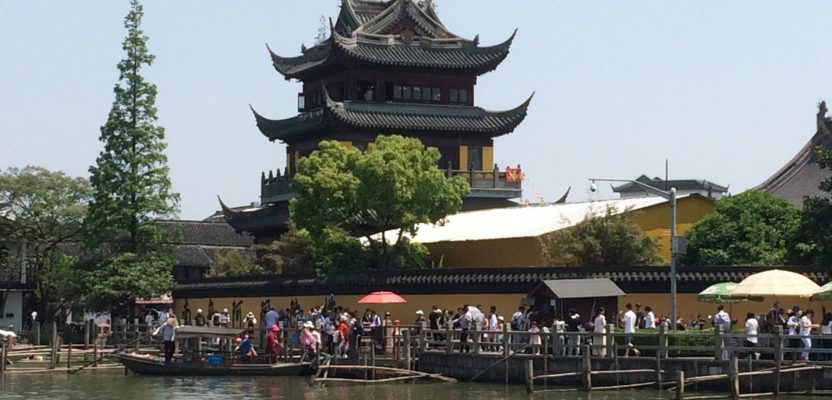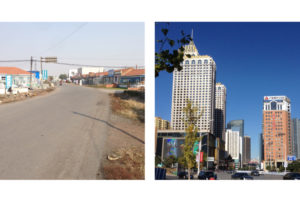6 Essentials To Enhance Your Travel Experience in China
“When in Rome, do as the Romans do.” Or get to know the Romans before you go, I would add. This motto also applies to those who plan to visit China, for business or pleasure.
In 2016, 59 million international tourists visited China. If you haven’t been there yet, it may be high on your list, thus preparing yourself beforehand to avoid getting caught off guard. You will soon learn that doing some homework should be beneficial, if not indispensable, to making the most of your trip.
Every country has their own customs. One would expect all the more so for a country like China with its many thousand years of history and civilization. It’s true, but no need to get jittery though. Growing up in China for the first 27 years of my life and then living in America for three decades or so, I’m increasingly convinced that people are more alike than they are different, regardless of their history and cultural differences.
Nevertheless, when you are halfway around the world on foreign soil, you may find the most seemingly trivial details perplexing if you are not somewhat prepared before setting your foot into the country. Some empirical advice could help make you feel more at ease or, should I say it, amused when faced with a foreign situation that you can see coming.
Here I have summed up six instances that would do the trick for you.
Conversation with the locals
As a guest in a major city in China, when the sky looks hazy on a cloudless day and you make a casual comment about the smog, for instance, your local hosts might feel slightly displeased even though it is so obvious. Immediately, a thought could jump to his mind (if not uttered in words): your country is not all that perfect either. Clearly, this was not the icebreaker conversation you had in mind. It’s like we can pick on the goofiness of our own kids, but the neighbors need to hold their tongues if they still want to stay neighborly. Are all the people like that?
If it happens to be one of the worst days (be it smog, harsh weather, or a traffic jam) during your outing in China, you want to cut your day short by going back to the hotel earlier, your jetlag can be one convenient excuse to get you off the hook. Then again, if your host starts to fret about the dreadful situation and apologize to you, you know you have a thoughtful guide. From there on, the conversation will be nothing but fun, even enriching, during your expedition.
Interacting with strangers
When you stand in line and happen to make eye contact with a Chinese, your usual charm and an instinctive nod might meet an indifferent look, as if he, or especially she, would say ‘what is wrong with this guy!’ It’s nothing personal. In fact, people will usually look away and won’t show even a timid smile at strangers. What is more, you will find that waitresses and store retailers often keep their usual stern faces when they are waiting on you. But, you can still be your cheerful self when you interact with strangers just so long as you don’t expect similar reactions in return. On the plus side, there is no tipping in any restaurants or hotels in China.
When you are the last one getting in an elevator, if no one holds that door for you, don’t feel too astonished. It’s not customary to do so for strangers. Of course, you can still do it for others, and occasionally, some people may appreciate it with rare friendly eye contact with you, or even a familiar ‘thank you’.
Walking amongst large crowds on the street is an everyday occurrence in most cities in China, but you don’t often hear people apologizing for knocking into each other or bumping shoulders, and you don’t need to excuse yourself either. Or you may end up repeating it until you get used to the situation. And you will.
Dinner time
Much of what you know about Chinese food is, should I say it, a watered-down version conveniently packaged in paper boxes and delivered to your door in America. For most foreign visitors, devouring genuine Chinese food is usually a priority on their minds—as is the case for our American-born daughter. Its varieties are so vast and diverse, more than most Chinese people could name. Therefore, choose it judiciously depending on which region you visit and how receptive your mind—and your stomach–is. For those gastronomes who are a little more daring than usual, some exotic delights might wow you and broaden your horizons in a completely different foodie culture.
A few tips to help ease your mind: ’slurping’ is, in fact, the proper way to eat noodles; using your hands may be the only way to relish whole fish and shellfish; however, ice water and salad are not prudent ideas. You should also leave your food-wine pairing ritual at home for the time being. Feel like having a cup of joe at the end of your meal? You could ask for it but be ready if the aroma (and taste) is not terribly pleasing. Keep in mind that coffee and wine have not completely blended in with the Chinese culinary ethos.
The locals will invite you to an evening dinner, which is a must if you have a Chinese friend or a host. People don’t order their own entrées, but the dinner table is often piled up with all kinds of dishes—more than you can count—to be shared and enjoyed “family-style”. That’s the tradition to receive guests (not necessarily very special guests) in China. In the course of guzzling, your hosts often raise their wine glasses or more likely their baijiu cups–a much more vibrant and fierier Chinese liquor–to you. Most importantly, stay alert to your alcohol tolerance before you become senseless by following their toasts. Taking it slow and eating more protein-saturated food should help even though you think you can handle it because the dinner could last a lot longer than you would expect.
When it comes to your turn to invite your hosts to a dinner in return, it can be a trickier situation for most Americans. Even when you shower them by going to the best steakhouse in town (you can find them in major cities like Beijing and Shanghai), your Chinese friends may still feel like there is not much to eat but one large chunk of meat with a few sides around it. Because of different gastronomic culture, Chinese stomachs have little appreciation for even the highest quality steak. Most people cannot tell the difference between cuts of steak, much less their merits. So how do you get out of this dilemma without letting your friends down? That would depend on how much you know about Chinese food to choose something that appeases everyone. Peking duck (toasted, cut, and displayed in the same manner universally), for example, is one safe choice and can be found in most cities if you don’t want to take the risk by trying bizarre food you have never heard of before.
Safety
Overall, in most cities in China, crime rates are low compared to major cities around the world. Recently, I talked to a friend who had been a police officer in Shanghai for 20 years and often visited his daughter who was a student at Johns Hopkins University. I asked him what the major difference between the policemen in China and America is. You don’t see them wear a gun at work, he said to me. No guns on the street in Shanghai, a city of 24 million people! And he is right – when I last went to a major celebration, I recall seeing many security personnel, but none of them carried guns, as best as I could tell.
Nevertheless, there are many reasons to keep a watchful eye while touring around in China.
Walking across the street could be an art because people do it differently regardless of the traffic lights. Looking back and forth, then around a couple more times is vital before setting your foot onward. Some cars might show up from nowhere; and slowing down for pedestrians is not to be expected. I’ve experienced many instances where automobiles making left turns often get a head start unexpectedly by speeding forward and cutting off cars going straight. If you take a taxi, your cabdriver may pull those maneuvers or other more precarious ones, there is nothing you can do except, perhaps, pray.
Wearing a seatbelt is required in China, but many people—both drivers and passengers—often ignore it. Do it anyway even when the cabdriver, very occasionally, throws you a disagreeable look as he thinks it’s so unnecessary.
If you want to get around like locals do by taking public transportation, which is a convenient and by far the cheapest option, be as resilient as the locals. At the subway station, people will not wait for you to get off the train before rushing to get on, some may even elbow their way onto the subway during rush hours. Do not take offense; just make your way through the crowds and you will get used to it over time. Be confident and equally assertive.
Don’t drink tap water anywhere like you usually do in your hometown. I wouldn’t even though my stomach is more immune to Chinese germs. Bringing a bottle of water or two from your hotel wherever you go is a good habit. However, you can brush your teeth with tap water, which is often questionable in many other developing countries.
One more thing though, when you buy fruits and vegetables from vendors or supermarkets, don’t eat it without sanitizing them first. I usually don’t eat salad in China (which is not commonly served anyway) but go for the better-prepared and thoroughly cooked items from the menu.
Shopping
It’s perfectly normal, even common, to haggle with street vendors in some areas of the city. Often times, they use a calculator to do the talking (many can converse in surprisingly good English though). When you point to something you like, the vendor will show you a number first, and you may punch in another number as a counteroffer, thus going back and forth. The street vendors’ biggest pet peeve is that the customer walks away after his or her proposed price gets accepted. Some serious arguments have arisen because that, I have seen. You could be surprised when the seller agrees to your counteroffer of half-off the labeled price.
The most successful tactic is to walk away when the retailer turns you down, if you don’t mind a slight gamble in losing out. More often than not, he or she will run up to you to hand you the merchandise consenting to your last bargain. That could mark the highlight of your day.
When nature calls
Last, but not least, when sightseeing anywhere or just strolling in the city, locating the designated place for nature’s call could be an enormous challenge. In addition, even when you are lucky enough to come across a public restroom, its condition could be third-world at best. To be prepared, always bring small packs of tissues and hand sanitizer because most public facilities are not equipped with anything (not even toilet paper).
One time a few years ago, we joined a tour to a beautiful mountainous region with our daughter for a day trip, but the “facilities” on the roadside were so unbearable anywhere within its 20-foot radius. She ended up refusing to go for the whole day. Although conditions have steadily improved in many parts of the country, albeit unevenly so, being mindful of the worst-case scenario is essential. This is especially prudent if you venture off the beaten path, and furthermore if you have teenage children traveling with you. It takes only one incident to upend the experience of your entire journey.
One hint when you are in the city: look out for a McDonald’s or any Western chain eateries and use their facilities even when you don’t need to go. You may not run into one again. No matter what you think about the food, their lavatory conditions hold the same high standards throughout China.
“Travel is fatal to prejudice, bigotry, and narrow-mindedness.” Mark Twain famously put it.
Or, conversely, travel could be fatal if you are unprepared. For that reason, be well primed for it especially mentally. Plus, with an extra dose of audacious spirit, your cross-cultural, intercontinental trek will be nothing short of mesmerizing and enlightening.



